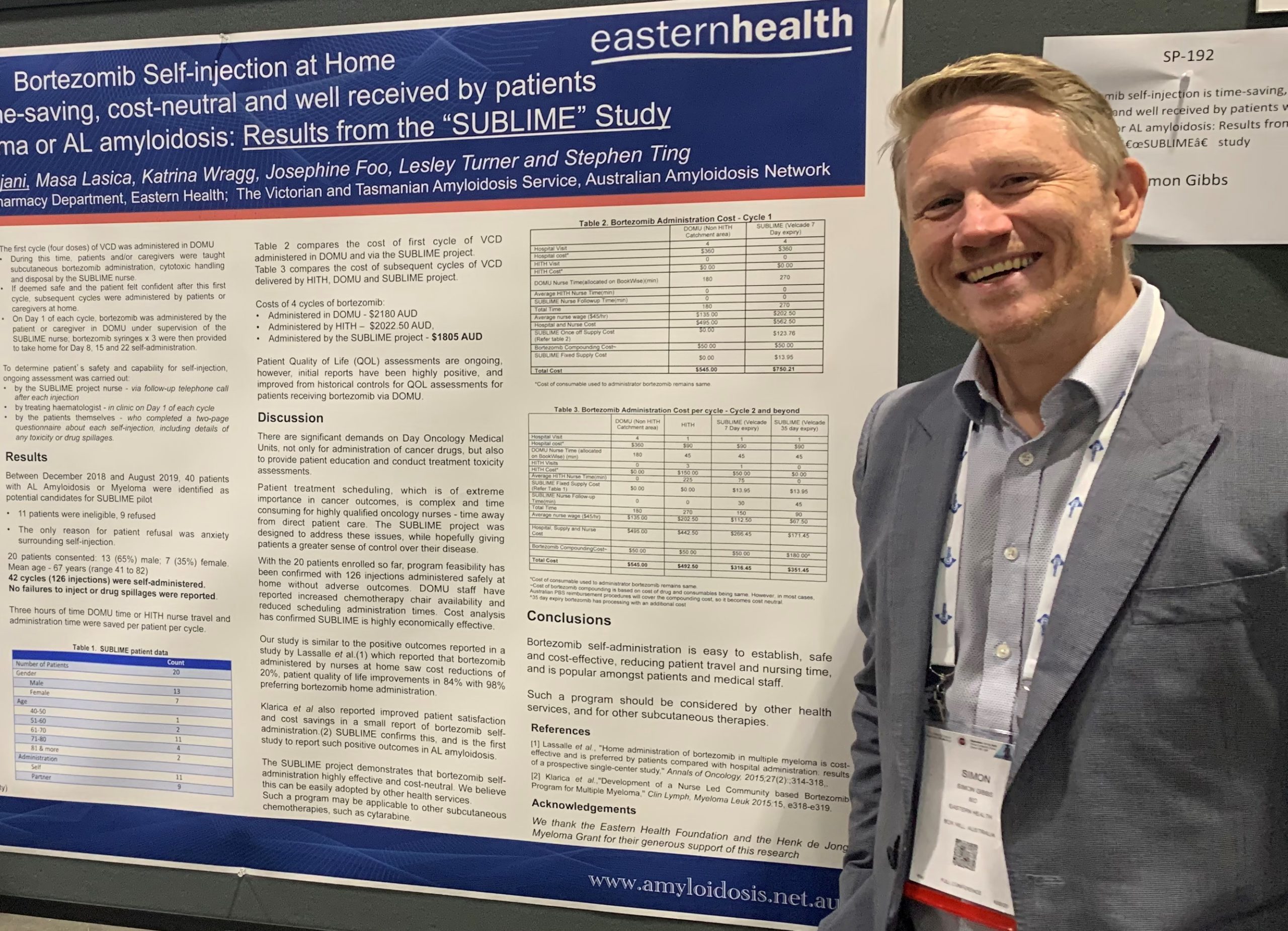AL amyloidosis trials due to open this year offer “new hope”

Two clinical trials will open later this year for newly diagnosed patients with AL amyloidosis with moderate to severe cardiac disease.
These studies will hopefully address a major unmet need, according to Dr Simon Gibbs, Director of the Victorian and Tasmanian Amyloidosis Service, and a founding member of the Australian Amyloidosis Network (AAN).
“The big challenge we have is that group of patients who have been diagnosed late with severe cardiac disease,” said Dr Gibbs.
“We know that, unfortunately, up to a quarter of these patients still die within six months of diagnosis.”
Dr Gibbs said the other 75% “often enjoy really good responses to treatment” and “we know that patients have very good outcomes if we get control the excess production of light chains quickly”.
“Not everyone responds as well as we’d like to our standard upfront therapy, VCD (Velcade®, cyclophosphamide and dexamethasone),” he said.
“Daratumumab is clearly an effective therapy to rescue patients who have poor responses to VCD, and the ANDROMEDA study proved that using daratumumab with VCD improves response rates.
“But we really need more rapidly effective treatments for patients presenting with advanced cardiac disease, or who don’t respond well enough to VCD.”
“We are hopeful two upcoming trials, the AFFIRM-AL (birtamimab) study and the CAEL-101 trial, will help address this unmet need, help to overcome early mortality, and may offer advances in patient quality of life and survival,” said Dr Gibbs.
Both Phase III global trials are looking at the standard therapy for AL–VCD–plus either birtamimab (previously called NEOD001) or CAEL-101. These drugs are monoclonal antibodies that target the amyloid deposits, and an aim of these studies is to clear the amyloid from affected organs.
Birtamimab was studied previously in the VITAL study. While the overall patient group in this trial did not significantly benefit with the addition of birtamimab to VCD, there was a strong suggestion that patients with advanced cardiac disease obtained the most benefit, and may have enjoyed better outcomes than the group that received VCD alone.
“One problem with the VITAL study was that there weren’t enough patients in the advanced cardiac group to be sure that birtamimab was beneficial, but the signs are good. So we are hopeful the AFFIRM-AL study will show a positive result,” said Dr Gibbs.
These two trials will look solely at people with advanced cardiac disease at diagnosis, to see if these drugs, which help to strip away the amyloid, have benefits for this group.
“We are always on the lookout to ensure our patients connect to the world’s best novel treatments and clinical trials,” said Dr Gibbs.
“The good news is that patient outcomes are improving overall.
“We’re finding that patients with mild to moderate disease at diagnosis generally do very well and tend to be living a lot longer.”
“Most patients will obtain a good remission from their AL amyloidosis.
“Patients are surviving much longer than 10-20 years ago,” said Dr Gibbs.
“This is because we now have access to newer, more active drugs like bortezomib (Velcade®), and lenalidomide (Revlimid®).
“We are also much better these days at choosing which patients will benefit from stem cell transplants, and daratumumab has recently been shown to be of significant benefit to many patients with AL amyloidosis, which is a very exciting advance,” he explained.
“In addition, there’s a greater understanding of medications that can help support the affected organs, and there are more amyloidosis centres of excellence around the world, so there’s more knowledge.”
Another trial will soon be available for relapsed AL amyloidosis
Dr Gibbs said a third trial, for relapsed/refractory AL amyloidosis, also “will hopefully be starting at the end of the year if all goes well”.
“It’s an Australian-French collaboration, which we are very excited about.”
Last updated on January 3rd, 2023
Developed by the Leukaemia Foundation in consultation with people living with a blood cancer, Leukaemia Foundation support staff, haematology nursing staff and/or Australian clinical haematologists. This content is provided for information purposes only and we urge you to always seek advice from a registered health care professional for diagnosis, treatment and answers to your medical questions, including the suitability of a particular therapy, service, product or treatment in your circumstances. The Leukaemia Foundation shall not bear any liability for any person relying on the materials contained on this website.